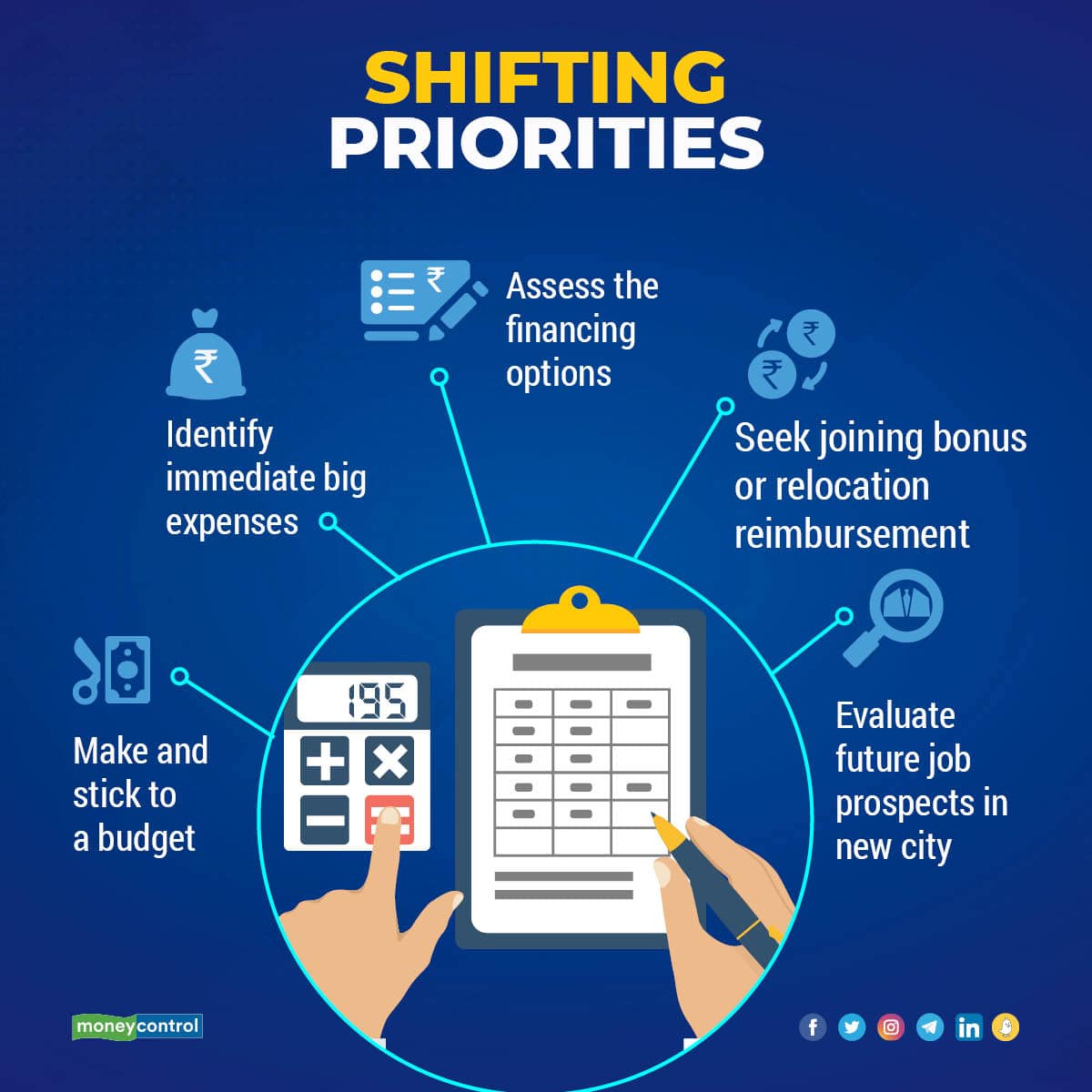



Sameer Panchal, 28, a software engineer in Indore, got laid off in April 2021 after his company took a severe hit from the COVID-19 pandemic. In search of better job prospects, he moved to Hyderabad in December 2021, given that the southern city is a hub for information technology companies. After several interviews, Panchal landed a job in January. This was a lifeline in more ways than one. Panchal says, “When I moved to Hyderabad, which was a completely new city for me, I had a difficult time settling down.” He had no job in hand, and had to incur additional expenses on food and lodging, unlike in Indore where he lived with his parents, which ate into his savings. He adds, “I was not financially prepared for this move.”
Panchal’s is a cautionary tale for those thinking of relocating for whatever reason. Here are six things to check off before making that move.
Have a budget in placeThis is of critical importance. In your budgeting sheet, take into account the fare to travel to the new city, the likely accommodation and food outgo, the expense of transporting household goods to the new place, local commuting costs, and so on. “You should also consider non-tangibles like medical expenses in case elderly parents are accompanying you, school admission (and fees) for your child, etc.,” says Arun Ramamurthy, director, Andromeda Sales and Distribution, a distributor of loan products and credit cards.
A smart thing that Panchal did was to go alone to Hyderabad to scout and get familiar with the city before bringing his family over. “This gives him a scope to put things in shape without draining finances too much,” says Adhil Shetty, CEO of fintech company BankBazaar.com.
Plan for the big expensesPanchal’s first major expenditure in Hyderabad was to arrange for a deposit of Rs 50,000 to rent a house, and then some more to furnish it. This spending could have been deferred. “Instead of opting for a rented home immediately after relocating, decide to stay in a paying guest accommodation, for the initial three months. This way, you will not have a burden of paying a security deposit to a landlord,” says Suresh Sadagopan, founder and principal officer of Ladder7 Wealth Planners.
But there’s no escaping having to hit the bank. “You may not move all your belongings and may have to invest in some new things, especially white goods. So this could be an additional expense,” says Shetty.
There’s a workaround for that too, though. Instead of buying new appliances, you can hire them, at least for the initial three to six months, from firms like Furlenco and NoBroker. These companies actually specialise in renting furniture, so there is that option too. However, their services are not available in all cities.
Like everywhere else, you would need to keep a certain amount handy to pay for utility services such as cooking gas, electricity, broadband internet, and so on.
“If you have children, a change of schools comes with a capitation fee that can run into several tens of thousands or even a lakh, it varies from school to school,” says Shetty. You may also have to spend on expensive peripherals, such as school transport.

Panchal had to break his contingency fund investments while moving to Hyderabad, withdrawing Rs 1 lakh. “This is one of the first options most people consider for arranging the funds to relocate in a new city,” says Rajarshi Mitra, brand manager, HomeFirst, a housing finance company.
“Alternatively, negotiate for relocation expenses with the new employer seeking your presence in another city,” says Ramamurthy of Andromeda Sales. Some companies also extend salary advances to new hires to ease their relocation process.
If unlike Panchal you are merely shifting cities but within the same company, this process is a lot easier, as relocation expenses are far easier to come by. There is also another attractive option when moving without changing jobs—company accommodation (though it’s not available in all cases). “You can negotiate with the employer to provide you the company guesthouse for an initial one to three months after joining,” says Sadagopan.
However, even in such cases, assess the cost of living in the new city vis-a-vis the one you are leaving. If you are moving to a big city like Mumbai, rental costs can be astronomical compared with what you have been used to. Talk to your employer to see if you can get a hike to compensate for the higher cost of living. “You can negotiate for a joining bonus, which can be utilised for relocation expenditure,” suggests Sadagopan of Ladder7.
Evaluate future job prospects before relocatingPanchal’s choice of Hyderabad as the city to relocate to was a wise one considering that the city has a large number of companies operating in his field of expertise. Similarly, it is vital that you consider future job prospects in the city you are planning to relocate to. “You must evaluate the cost of living in a new city with the growth in income and savings while relocating,” says Ramamurthy.
Reassess your financial goalsBear in mind that the decision to relocate will have an effect on your short-term goals. This is because there are several expenditures involved, as discussed above. Some people like Panchal may have to withdraw money from their contingency fund to meet these unplanned expenses. Shetty advises, “Make sure you reinstate the amount withdrawn from contingency funds by saving from monthly income.”
However, the long-term goals typically don't change with this professional decision. You need to continue your investments towards your medical contingency goal, children’s education goal, your retirement plan, etc., and review them periodically.
Should you buy or rent the home?Buying a property in a city you have just moved to with a job is definitely not advisable. Stay as a paying guest for the initial period, then decide on renting a home. “Stay in a relocated city at least for a year and get comfortable with the locality. Relocating in another city takes around a one-year timeframe,” says Mitra.
In fact, many also prefer to first shift to a new city on their own and bring their families across only after getting comfortable with the new location.
Try to get the flavour of a new city. You must understand its local culture, the geography, and the property landscape before taking a decision to buy a property. “Once you are sure of settling in the relocated city and know how the property market operates in the city, you can consider buying as an option,” Shetty advises.
Discover the latest Business News, Sensex, and Nifty updates. Obtain Personal Finance insights, tax queries, and expert opinions on Moneycontrol or download the Moneycontrol App to stay updated!
Find the best of Al News in one place, specially curated for you every weekend.
Stay on top of the latest tech trends and biggest startup news.